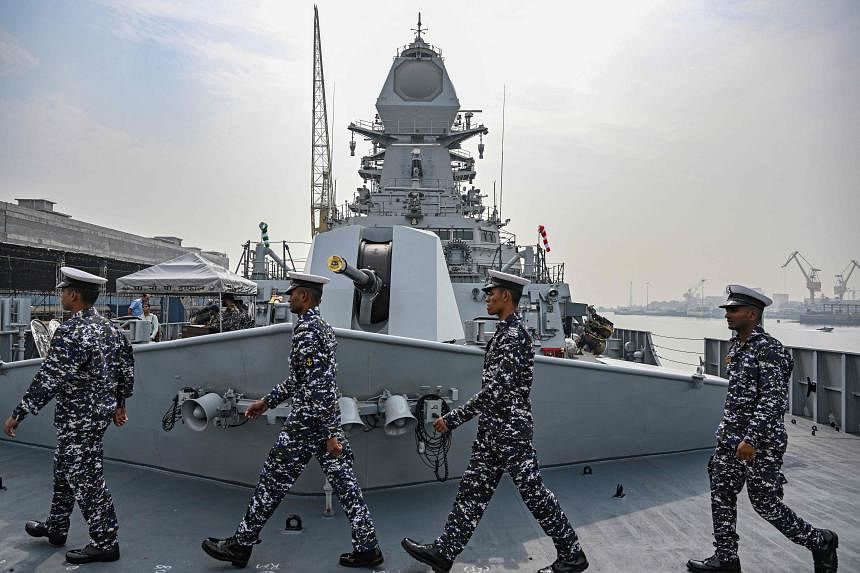NEW DELHI - India’s newly commissioned naval base in the Lakshadweep archipelago off the nation’s west coast is expected to fortify the South Asian country’s surveillance of the Indian Ocean and send a strategic message as China seeks to expand its influence in the region, analysts said.
The Indian Navy on March 6 commissioned the base INS Jatayu on Minicoy Island, which is on the southernmost tip of Lakshadweep and lies near one of the busiest shipping routes from the Red Sea to East Asia. The island is about 400km south-west of Kochi, in Kerala.
INS Jatayu is the second naval base in Lakshadweep after INS Dweeprakshak on Kavaratti island.
Navy chief R. Hari Kumar said the new base would be India’s “eyes and ears” like INS Baaz, a military base on the Andaman and Nicobar Islands in the north-eastern Indian Ocean.
He added that it would increase the Indian Navy’s surveillance capacity after a recent surge in piracy in the Gulf of Aden.
On March 6, the Indian Navy rescued 21 crew members after a missile fired by Yemen’s Houthi rebels hit a bulk carrier in the Gulf of Aden, the navy said on social media platform X (formerly Twitter) the next day.
Admiral Kumar added: “The navy’s growing strength is not just to cater for these short-term, ongoing crises, but more importantly to ensure the future balance of power in the Indo-Pacific region.”
Plans on Minicoy include an airstrip. The Indian Coast Guard said it is building a new air enclave, which includes a hangar, for its aircraft, to “enhance the reach of air-sea coordinated” operations.
The newly commissioned base is also close to the Maldives, which has been drawing closer to China under its President Mohamed Muizzu.
The Maldives and China on March 6 signed a military pact, under which Mr Muizzu said his country would source “non-lethal” military equipment from China, which would also help train his country’s military.
Mr Muizzu had come to power in September on the back of a campaign promise to remove Indian troops from the country, and had stoked fears that Indian influence had grown under the previous president Ibrahim Solih, who was seen to be friendly towards India.
To his accusations of India being a “bully”, India’s External Affairs Minister S. Jaishankar said “big bullies don’t provide US$4.5 billion (S$6 billion) (in aid) when their neighbours are in trouble”, or vaccines or food.
Major General (Retired) S. B. Asthana, a global strategic and defence analyst, said the new base would send a “strategic message” that India would continue to bolster its naval capabilities in the Indian Ocean amid the growing closeness between the Maldives and China.
However, “the Chinese will increase their influence in the Indian Ocean” to secure the sea lanes through which its oil supply from the Gulf is transported, he said. Two-thirds of the world’s oil shipments move through the Indian Ocean.
The United States-based Centre for Strategic and International Studies reported in January that 13 civilian vessels undertaking survey and research activity in the Indian Ocean since 2020 have links to China’s military. Their “questionable activities” included docking at Chinese military ports, temporarily turning off tracking devices, and entering the exclusive economic zones of other countries such as Bangladesh.
While the report noted all countries carry out such research, it said China is also using its fleet of civilian research vessels, the largest of any country, to “advance Beijing’s strategic ambitions”.
China responded by saying the activities were in line with the United Nations Convention on the Law of the Sea and had “contributed to the marine and scientific area”.
The report was released while Mr Muizzu was visiting China, and after Sri Lanka told India it would not allow any Chinese research vessels to dock at its ports or go into its exclusive economic zone.
“The development of these islands (Lakshadweep) and consequent bolstering of security apparatus there serves India’s maritime interests in the south, given that the northernmost island of the Maldives is just another 80km away. And more so, in light of the recent pushback efforts by the Maldives owing to Chinese influence on the current leadership in Male,” said retired vice-admiral Biswajit Dasgupta, a former commander-in-chief of the Eastern Naval Command.
“India plans to bolster the security of its western and southern maritime areas by developing naval infrastructure in the Lakshadweep,” he added.
India has also sought to boost ties with other Indian Ocean island nations. Prime Minister Narendra Modi and Mauritian Prime Minister Pravind Jugnauth on Feb 29 jointly inaugurated an airstrip and jetty India built on the remote island of Agalega in Mauritius.
“The western Indian Ocean region has acquired considerable strategic relevance over the past two decades for India – and the major powers,” noted Mr C. Uday Bhaskar, director of New Delhi-based think-tank Society for Policy Studies.
The importance of the Indian Ocean islands would only assume “greater importance for the operational potential they inherently possess due to their geography”, he said.


